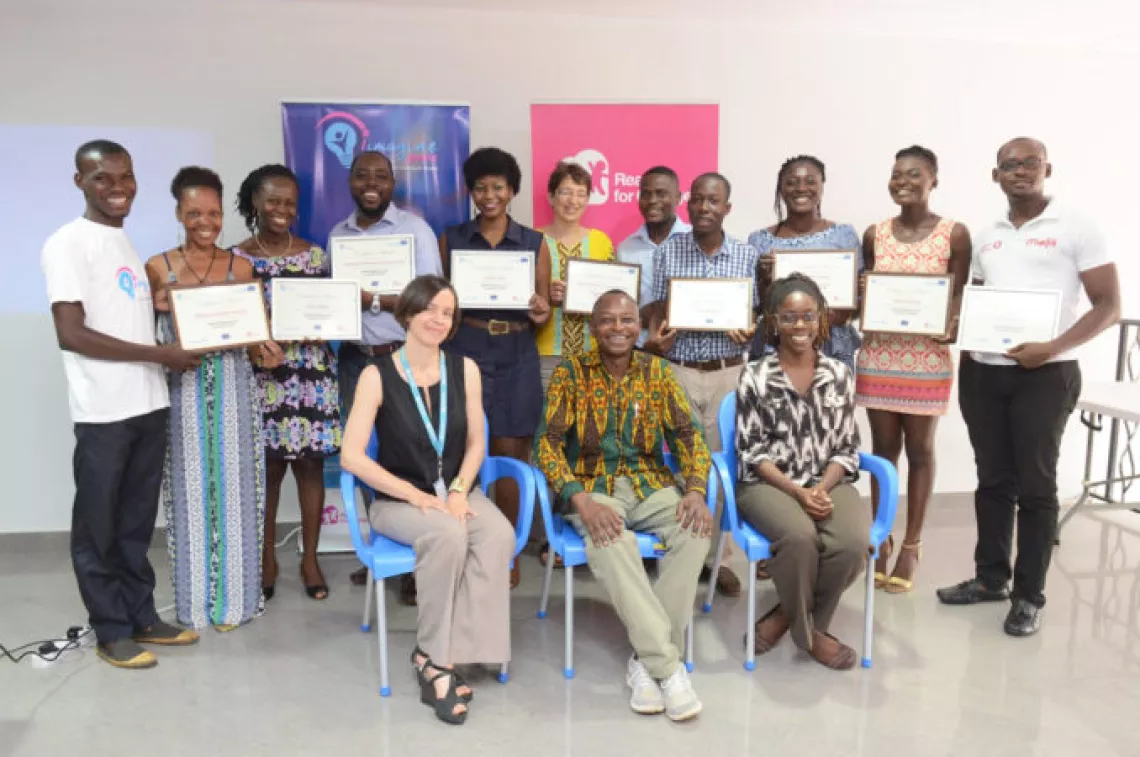"I Imagine Ghana" Incubator Programme
Supporting local social innovators to take their solutions to scale

Challenges faced by children and their families have rapidly evolved due to urbanization, climate change, lack of employment opportunities, broken education systems, increased disparities, and digital divides. New problem-solving approaches are essential to address these challenges.
In Ghana, as in many other countries, local innovative problem-solvers are developing solutions to improve the lives of children. What they need now is the support to take their solutions to scale. To address this need and also support the local innovation ecosystem more holistically, UNICEF Ghana partnered with Reach for Change foundation and the European Union to establish the “I imagine Ghana” an innovation incubator programme in 2015.
The primary goal of “I imagine Ghana” is to support local social innovators, and bring their ideas to life through financial support from UNICEF and the EU and business coaching and mentoring assistance provided by Reach for Change and their affiliated network of experts.
Out of the over 200 applications received from local innovators across all UNICEF programme areas: Child Protection; Health & Nutrition; Water Sanitation and Hygiene; and Voice and Youth Participation, 7 innovators were chosen to be part of the incubator programme for a year.
Financial grant of up to USD 8,201.00 (depending on need), and mentoring and coaching support were provided to each of the 7 selected innovators that participated in the incubator programme.


By the end of the 1-year incubator programme, these 7 innovators have showcased remarkable achievements. Meet these innovative game-changers and problem-solvers here today:
Linda Ansong thinks that if children receive a better curriculum for science, technology, engineering and mathematics (STEM) education, they would have more chances to succeed in adult life. Her goal is to open a centre where children will be taught ICT and STEM in a fun and practical way.
Through “I imagine Ghana”, she in partnership with other organizations, has trained around 300 young school girls on how to code and formed STEM clubs in two urban poor schools.
Bernice Dapaah’s goal is to address teenage girls’ challenges relating to menstrual hygiene this she believes will also help them not shy away from attending classes in school. Through her business, she plans to set up small manufacturing plants that produce, using a technique piloted in Kenya, sanitary pads made with local materials.
Although Bernice is still on a quest to establish a manufacturing plant to produce re-usable sanitary pads, she was able to provide education on personal and menstrual hygiene in rural schools – reaching about 5,000 girls.
Cordie Aziz is passionate about environmental education, and believes that a cleaner and healthier Ghana is possible if we engage with children. Her goal is to open a centre that will provide a safe and stimulating space for underprivileged children. This space will equip children with knowledge around environmental protection, sanitation, and creative use of recycled materials.
Through “I imagine Ghana” she was able to hold Environmental Seminar for a total of about 310 children from two slum schools in Accra.
Ernest Gavor had developed a mobile app prior to joining the incubator programme. This app aims to register potential blood donors, link them to the blood banks closer to them, and in exchange for a small fee, provide them with online medical advice 24/7.
Through“I imagine Ghana”, he launched the mobile app creating awareness on the need to donate blood, and has organized blood donation events with the support of other partners such as the Ghana National blood service across 4 locations.
Randolph Rodrigues and Wolanyo Amoa are very passionate about education. Prior to joining the incubator programme, they were working on developing an online application to promote writing and creativity among children.
Through “I imagine Ghana”, they recruited a developer to help fine-tune their web-based and mobile phone apps promoting writing and creativity among children. The app has been piloted and used by about 30 Kindergarten pupils.
Wilson and Zakyia Amooro’s goal is to bring classical music to remote areas of Ghana. To achieve this, they want to provide children with musical training using musical instruments created from recycled materials.
Through “I imagine Ghana”, they have formed an orchestra and classical music group consisting of about 2,430 children. This group teaches children how to play the violin and how to make and play local musical instruments (e.g. Kalimba).
Prior to the incubator programme, Ishmael Hammond and Margaretha Ubels have created an offline methodology (FonixGH book) that uses the phonetic sounds of the Twi language (the most commonly spoken language in Ghana) to teach children with learning difficulties how to read.
Through “I imagine Ghana”, they have secured a copyright for the FonixGH book and presented promotional copies of FonixGH to the Ghana Education Service (GES) for assessment. The methodology has so far been piloted in 5 schools, where 42 teachers were trained on its usage.
The “I imagine Ghana” project officially ended in July 2016. However, insights from the review of the project suggest that to achieve sustainability, the project should be extended for an additional year (up to December 2017) to further support the innovators to scale their ideas.
A new agreement has therefore been signed between UNICEF Ghana and Reach for Change foundation to support the entrepreneurs in the incubator programme for an additional year.
Through this agreement, Reach for Change will provide each entrepreneur with the opportunity to work with at least one business consultant to address a specific problem or challenge they face in their project; create a knowledge sharing and networking platform amongst the I imagine Ghana innovators and other innovators from different incubator programmes; and provide co-working space and communication channels for these 7 changemakers.




